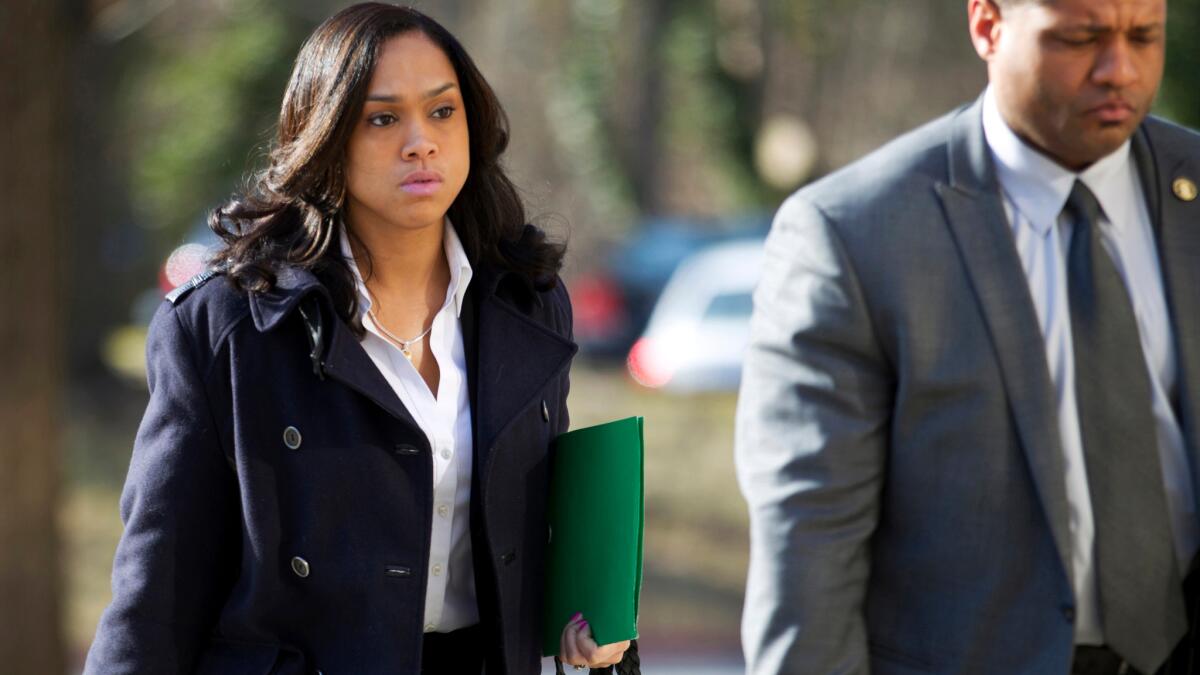As acquittals add up, Freddie Gray prosecutor feels the heat

Reporting from Baltimore â Baltimore Stateâs Atty. Marilyn J. Mosby instantly became a controversial figure across America â lauded as a hero by the left and decried as a demagogue by the right â when she brought charges against six police officers in the arrest and death of Freddie Gray.
More than a year later, her repute is even more debatable.
With two officers acquitted and a third now on trial, Mosbyâs critics are calling for her to resign and to drop the charges against all of the officers. Detractors say she has demoralized the Police Department and emboldened criminals, and speculation has begun about who would challenge her re-election in two years.
âSheâll try to say, âAt least I tried. Isnât that a good thing?ââ said Roya Hanna, a former Baltimore prosecutor. But she added: âI think indicting people when you have no evidence to convict them shows a serious lack of judgment.â
Boosters, meanwhile, applaud Mosbyâs efforts to seek justice. Win or lose in court, they say, her prosecutions helped to spur reforms by exposing deficient police policies and the purchase of safer police vans with cameras inside. Gray, 25, died after suffering spinal injuries as he was transported, shackled and unbuckled, in the back of a police transport van.
The fault lines over Mosby intensified after a judge acquitted Officer Caesar Goodson Jr., the van driver, on all charges.
Mosbyâs office provided The Baltimore Sun nearly two dozen racist, sexist and threatening emails as a sample of the type of attacks she receives. One includes a fake obituary of Mosby and describes her being âgunned downâ and her family members being hurt.
Rochelle Ritchie, a spokeswoman for Mosby, said the office receives such emails, phone calls and posts on social media daily.
Baltimore police are âlooking into this situation,â spokesman T.J. Smith said. David Fitz, a spokesman for the FBIâs Baltimore office, said his agency is working with Baltimore police.
Ritchie said the threats âare being taken very seriouslyâ but declined to comment on security measures.
She declined to discuss the Gray case, because the judge has imposed a wide-ranging gag order, but said that Mosby âwill continue to pursue justice for all victims of crime in Baltimore City in an attempt to make our city a safer place.â
Those on either side of the Mosby debate seize on different crime and policing statistics.
Complaints against police officers are down sharply in Baltimore, and Mosbyâs supporters credit her decision to press charges as contributing to the decline. Through the first half of 2016, 215 citizen complaints have been lodged against the police â a 37% decline from last year, data show. Excessive-force complaints have declined to 41, a 39% drop.
âMosby has sent a clarion message to rogue city officers who believe they are above the law, that they better take heed,â said attorney J. Wyndal Gordon, who has closely followed the case.
Testimony during the officerâs trials, Mosbyâs supporters said, alerted the public that police lacked training in how to handle detainees and were unaware of a new department policy to secure detainees in seat belts.
In a city that has paid out millions in recent years to settle lawsuits alleging police misconduct, the trials also focused attention on police accountability and misconduct. Mosbyâs backers said the case put pressure on Maryland lawmakers to pass legislation overhauling police discipline, hiring and training, and on city officials to equip officers with body cameras and implement a range of reforms.
But critics say Mosbyâs insistence on prosecuting the officers has opened a rift between police and prosecutors, who must work closely to bring criminals to justice.
Arrests declined sharply in Baltimore after Mosby announced the charges and have yet to fully rebound. In May 2014, for instance, there were 3,753 arrests in Baltimore compared with 2,165 this May. Last year ended with 344 killings, a record number of homicides per capita, and shootings are even higher this year.
City Solicitor George Nilson said itâs clear some officers have shied away from aggressive law enforcement because of the charges, prompting some criminals to feel empowered.
âTheir attitude is, âWe own the streets,ââ Nilson said. âHow could criminal charges ... not have an impact on police culture? Itâs going to have an effect. One is a good effect; the other is a not-so-good effect. It could reduce the level of excessive use of force, but it could also make officers more timid and less willing to do the things we all thought the Supreme Court told us we could do.â
Broadwater writes for the Baltimore Sun.
ALSO
Obama on deadly police shootings of black men: âWe can do betterâ
Police didnât show up to protests over killing in Baton Rouge, in striking contrast to Ferguson
She wasnât a cop and she wasnât white, but she took a bullet in Dallas while protecting her sons
More to Read
Sign up for Essential California
The most important California stories and recommendations in your inbox every morning.
You may occasionally receive promotional content from the Los Angeles Times.










